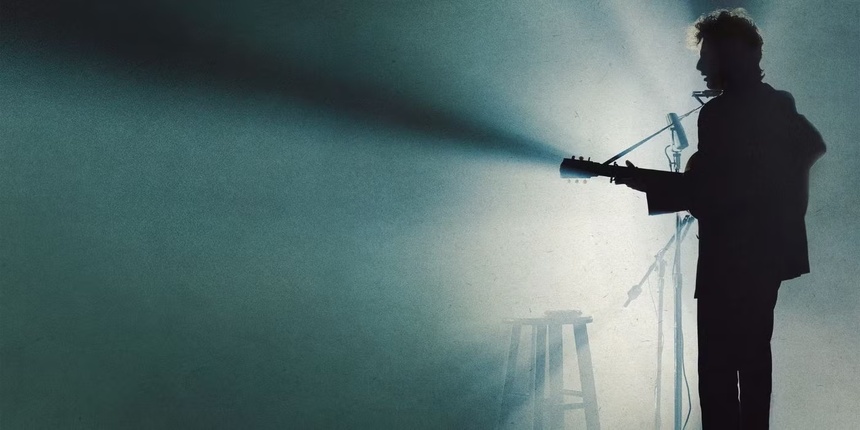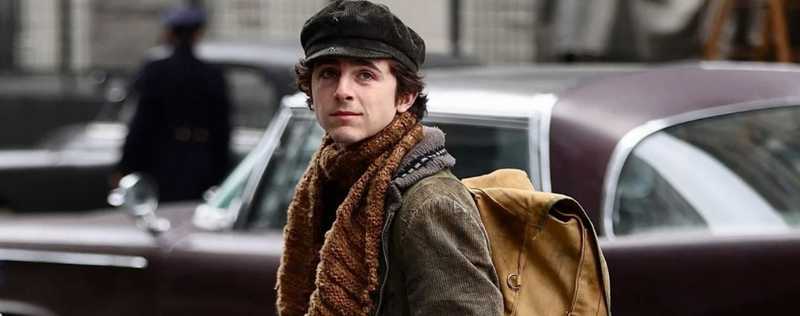A COMPLETE UNKNOWN Review: The Coles Notes of Bob Dylan
Timothée Chalamet stars as the iconic American folk singer in James Mangold's biopic

It's not surprising that there is a probable audience for a biopic on Bob Dylan, America's greatest folk singer/songwriter, a true living legend who has released over 50 albums, and is still going strong, doing tour at the venerable age of 83. Given how long he's been around, and how important his role in the history of American music has been, his life is filled with moments that would be ripe for the proverbial plucking and examination.
That's the problem with biopics: how do you chose which part of a life to focus on? Biopics that cover an entire life, especially one that is long-lived, end up being a kind of 'greatest hits' that give only a sampling, rather than the depth that would be so much more interesting to get to know the person under scrutiny.
The other issue with a Dylan biopic: there already is one, and not only is it the perfect biopic of an enigmatic figure such as Dylan, it's one of the greatest and most innovative biopics ever put to screen. There is no sense trying to top it, as it's impossible. But that also means, that anything that comes after it, cannot help but pale in comparison. That doesn't mean an attempt can't be made, but if you are going to go for the more traditional biopic, you had better make sure it finds something unique to say, or at least give the audience enough substance to make for a favourable comparison.
Alas, A Complete Unknown doesn't quite hit the mark. James Mangold understandably had a difficult task, but instead of a more traditional yet still deep and interesting look at Dylan, we're left with the kind of superficial plucking of moments that provide little insight. While there are some very strong scenes and some good performances, it ends up being less than the sum of its parts, and those parts seem presented as if they did not need to be explaination or understanding.
A Complete Unknown, to give some credit, does focus on a short period in Dylan's life: 1961-1965, from his arrival in New York City, his rise as a folk music star, to his infamous performance at the Newport Folk Festival that marked the beginning of his electric period. It's bringing in some of the most important people in his life in this period: Pete Seeger (Edward Norton), Joan Baez (Monica Barbaro), his girlfriend Sylvie (Elle Fanning), his manager Albert Grossman (Dan Fogler), Bob Neuwirth (Will Harrison), and Woody Guthrie (Scoot McNairy). The trouble is, so much happened to Dylan in these years, that even this short period falls into the 'greatest hits' trap of scenes that seek to provide a general overview rather than a focus that would give more in-depth understanding.
We witness Bob arrive, already perhaps a little brooding and cynical at the tender age of 20, in New York, and through a combination of luck, talent, and drive, find himself rising through the ranks of the film kusic scene. There are some moments where we can witness the process of Bob's songwriting, his learning process in the recording studio, his learning process in doing live gigs - well, that takes up some time, as well as his various romantic and sexual adventures. The personal and the professional did and do collide, and it keeps the story spicy, in theory, especially since one of his objects of affection was also a folk star. And it seems a minute later, Dylan has screaming fans à la Elvis Presley, and a simmering anger and frustration for what he sees as artistic stagnation. Cut to meeting new people and deciding to go electric.
We shouldn't expect any biopic to show exactly what happened, as it happened; artistic license should be allowed, to account for jumps in time, or to evoke the necessary understanding without it being xactly as factually occured. But at what point does that license exceed what is necessary to make its point? In one scene, Sylvie and Bob are watching the news of John F. Kennedy's assassination. Sylvie is distraught, while Bob looks bored. And yet, he would go on to write a song about the tragedy. In another, Bob says exactly those platitudes of 'I can't be held back by the past' in such a serious manner, randomly, to a stranger, in an elevator, in a such a falsely earnest manner that it almost elicits a groan. Seeger didn't consider taking an axe to the Newport Folk Festival sound system because he was angry that Bob was playing electric, but because he thought it sounded so distorted that no one could understand what was being sung. (I should mention, my boyfriend wrote a book on Bob Dylan, so I was able to ask him a lot of questions about the events in the film, their accuracy, and how they were presented). All of these moments make us feel differently about what they mean to Dylan and his, than we would if they were a little more true to life.
Where the film excels, are in the music scenes, as it should. When a still newby Bob visits Guthrie in the hospital, and plays him a song that he wrote for the ailing troubadour, it's a moment of intimacy and connection that almost had me convinced that Mangold could pull off what he wanted. Scenes in the New York clubs such as Gaslight Cafe and White Horse Tavern, or when Dylan and Baez perform together; these are the scenes that feel like both a warm hug and a view on the man, in his moments of greatest love and greatest fear or anger. This is where the film feels like it has heart and soul.
Chalamet does his own singing, and it's to his credit that he does a great job - finding the necessary cadence and styling without trying too hard to imitate Dylan (an impossible task); when he sings, he finds Dylan's essence. With the performance? Well, Dylan has admitted that he was not a great guy in these years, and Chalamet presents him as a mostly selfish, brooding jerk, who ends up mostly using those around him, no matter how they offer him assistance and praise. He does give hints as to how Dylan felt when it was clear that far too much pressure was on him as the saviour of folk music (i.e. he never wanted that mantle).
I like Chalamet as an actor, and I wanted to like him as Dylan, since he clearly cares about the role. But his performance, and the film, often fall into the trap of making Dylan just another brilliant artists whom we'd almost rather not know anything about, since he doesn't seem to be worth knowing. And that's a problem with a biopic; the subject definitely doesn't have to be likeable, but if we're going to watch a 2-hour plus film about them, it has to be worth knowing them, worth the time to deepen our understanding of them, and why they are important in our culture and history.
Norton shines as Seeger, showcasing the man's kindness and gentle nature, who understood Dylan's importance and wanted to be a mentor, even if he didn't always understang the young man. Barbaro as well captures Baez as someone who knew how to balance the power of their work with their own life, whose love for Bob did not outweight her self-preservation. Fanning is great, but it's a thankless role, the unfortunate stereotype of the women-character-as-lampshade, and not nearly worthy of the actor's talent.
If you know nothing about Bob Dylan (though I expect that is not the target audience), A Complete Unknown might not help too much in knowing more, since it assumes a certain amount of knowledge of the man and the other great figures in the story. If you know a little about him, this might help you learn a little more. If you know a lot, how much you like the film will depend on how important it is to you, that the film tell you something new, or something old from a different perspective. Overall, the film feels more like an quick introduction to someone who only knows Dylan songs; which might be fine, but if you're looking for substance, well, there's another film out there that is more up your alley.
A Complete Unknown opens in the USA and Canada on Wednesday, December 25th.
A Complete Unknown
Director(s)
- James Mangold
Writer(s)
- James Mangold
- Jay Cocks
- Elijah Wald
Cast
- Timothée Chalamet
- Monica Barbaro
- Elle Fanning








